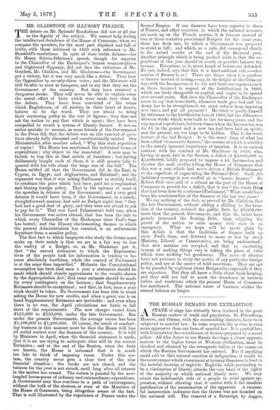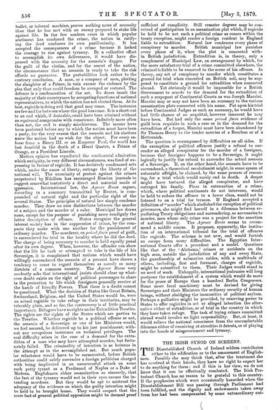THE RUSSIAN DEMAND FOR EXTRADITION.
ASTATE of siege has virtually been declared in the great Russian centres of trade and population. St. Petersburg, Moscow, and Odessa, with the surrounding districts, have been subjected to martial law. In some respects, the system is even more oppressive than any form of martial law. It is martial law, with Generals for the executioners of decrees prepared by a secret police. All who desire to see Russia develope a closer approxi- mation to the higher forms of Western civilisation, must be shocked and alarmed by the retrograde follies of the course on which the Russian Government has entered. But if anything could add to this natural emotion of indignation, it would be the countenance which resentment at tyranny threatens to lend to the hateful doctrine of regicide. Regicide, while pretending to be a vindication of liberty, attacks the very basis of the rights of the majority on which national liberty rests. We may admit the indefeasible title of a people to rebel against op- pression, without allowing that it carries with it the smallest justification of the assassination of the oppressor. A success- ful insurrection indicates that the throne was not founded on the national will. The removal of a Sovereign by dagger, Orange, or a President Lincoln. render an alleged conspirator for the murder of a foreigner, Modern opinion has repudiated the sentimental admiration because that foreigner happens to be a Sovereign, it ought which antiquity, in very different circumstances, was fond of ex- logically to justify the refusal to surrender the actual assassin pressing in favour of regicide. It has decisively condemned acts of a Sovereign. If, on the other hand, the assassin have to be which, under the name of liberty, outrage the liberty of the surrendered, a theoretical revolutionist might, in some spasm of national will. The unanimity of protest against the crimes autocratic affright, be claimed, by the same process of reason- perpetrated by Nihilism has encouraged Russian journals to ing, for a trial which would surely end in death. A despot suggest somewhat tentatively a direct and material mode of might have tortured the alleged conspirator, and have rpression. International law, the Agence Reese argues, outraged his family. Pleas in extenuation of a crime, according to a summary transmitted by Reuter, is com- which, where political sentiments do not intervene, would pounded of natural right and the particular right of the be held to reduce the offence to a lower class, would not be several States. The principles of natural law simply condemn listened to on a trial for treason. If England accepted a murder. They draw no nice distinctions between the murder definition of "murder" which abolished the exception of political of a subject and the murder of a ruler. Municipal law draws grievances, she might find herself in a dilemma between re- none, except for the purpose of punishing more condignly the pudiating Treaty obligations and surrendering, as accessaries to latter description of offence. States recognise the general murder, men whose only crime was a project for the assertion interest society has in the suppression of crime, by the com- of national liberty. The Agence Reese seems to recom- pacts they make with one another for the punishment of mend a middle course. It proposes, apparently, the institu- ordinary murder. The murderer, on prim/2 facie proof of guilt, tion of an international tribunal for the trial of offences is surrendered for trial in the locality where he did the deed. like regicide. The scheme is not new, and would furnish The charge of being accessary to murder is held equally penal an escape from many difficulties. The Egyptian Inter- -after its own degree. When, however, the offender can show national Courts offer a precedent and a model. Questions that the life he took or attempted to take is the life of his like that of the Alabama,' crimes or accidents on the Sovereign, it is complained that nations which would have high seas, outside the jurisdiction of any and every State, willingly surrendered the assassin of a peasant have shown a the guardianship of submarine cables, with a multitude of tendency to cease to regard themselves as merely so many others, including, first and foremost, charges of regicide, districts of a common country. The Agence Reese very might be submitted to them. Their Judges would stand in modestly asks that international jurists should clear up what- no need of work. Unhappily, international jealousies will long • ever doubt exists on the right of political personages to share postpone the establishment of a system which would do more in the protection to life which foreigners generally receive at for the peace of Europe than a hundred Berlin Congresses. the hands of friendly Powers. That there is a doubt cannot Some more local machinery must be devised for giving be questioned. What the decision of States like Great Britain, Sovereigns and their Ministers the ordinary security of human Switzerland, Belgium, and the United States would be, were beings, without abridging the immunities of political asylum. an actual regicide to take refuge in their territories, may be Perhaps a palliative might be provided, by reserving power to tolerably plain, and so far, the controversy is of little practical States to offer regicides in act or alleged intention the alter- importance. Refugees have no rights under Extradition Treaties. native either of extradition, or of trial in the country in which The rights are the rights of the States which are parties to they have taken refuge. The task of trying crimes committed the Treaties. Whether regicide be a political offence or not, abroad would involve no light responsibility. But, at least, it the assassin of a Sovereign or one of his Ministers would, would relieve the national conscience from the uncomfortable we feel assured, be delivered up to his just punishment, with- dilemma either of conniving at atrocities it detests, or of playing out any scrupulous insistence on technical privileges. The into the hands of misgovernment and tyranny. real difficulty arises in the case of a demand for the extra- dition of a man who may have attempted murder, but fortu- nately failed. The criminality of intention is as heinous in THE IRISH SYNOD ON SCREENS. the attempt as in the accomplished act. But much popu- THE Disestablished Church of Ireland seldom contributes be lar reluctance would have to surmounted, before British 1 either to the edification or to the amusement of English- authorities could safely surrender a foreign politician charged men. Possibly she may think that, after the treatment she with being implicated in an unsuccessful attack on some has received at their hands, they have no right to expect her such petty tyrant as a Ferdinand of Naples or a Duke of to do anything for them ; and if this is her view, we do not Modena. Englishmen abhor assassination so sincerely, that know that it can be effectually combated. The Irish Pro- the fact of the tyranny would not in their eyes excuse the in- testant Church has no reason to be grateful to this country. tending murderer. But they would be apt to mistrust the If the prophecies which were occasionally hazarded when the adequacy of the evidence on which the guilty intention might Disestablishment Bill was passing through Parliament had be held to be brought home. They would suspect that the been fulfilled, and the dignity and endowments taken away mere fact of general political opposition might be deemed proof from her had been compensated by some extraordinary out- bullet, or infernal machine, proves nothing more of necessity sufficient of complicity. Still remoter degrees may be con- than that he has met with an enemy prepared to stake life ceived of participation in an assassination plot which, if regicide against life. In the few modem cases in which popular be held to be not such a political crime as comes within the sentiment has condoned the crime, the nation in ratify- treaty exception, might render a foreign resident in England ing the deed confesses its own pusillanimity. It has liable to extradition. Natural law condemns every phase of accepted the consequences of a crime because it lacked conspiracy to murder. British municipal law punishes the courage to rise against tyranny. By a collective effort every phase of it, when the plot is concocted with- to accomplish its own deliverance, it would have dis- in British jurisdiction. Extradition is, in theory, only a pensed with the necessity for the assassin's dagger. For complement of Municipal Law, an arrangement by which, for the guilt of the victim, and for the assent of the nation, the more satisfactory trial of a crime committed elsewhere, the the circumstance that an assassin is ready to take the risk criminal is liable to be removed to the scene of his offence. In affords no guarantee. The probabilities look rather to the theory, any act of conspiracy to murder which constitutes a contrary conclusion. A man, or a company of men, plotting ground for trial when concerted on British soil, may be sup- the slaughter of a Prince, in vain excuse the violence by the posed to constitute a ground for extradition when concerted plea that only thus could freedom be avenged or restored. The abroad. Yet obviously it would be impossible for a British defence is a condemnation of the act. Its doers insult the Government to accede to the demand for the extradition of majority of their countrymen by arrogating functions of national such a scapegoat of Continental Courts as was Joseph Mazzini. representatives, to which the nation has not elected them. At its Mazzini may or may not have been an accessary to the various best, regicide is doing evil that good may come. The instances assassination plots connected with his name. Put upon his trial are few and far between where the good has come. It is a short-cut before Continental Judges as such an accessary, he would have to an end which, if desirable, could have been attained without had little chance of an acquittal, however innocent he may an equivocal compromise with conscience. Infinitely more often have been. But had only the same prinui facie evidence of than not, the end is simply mischievous. The means have guilt been requisite in such a case as in the demand for the been preferred before any to which the nation must have been extradition of a forger, Mazzini must have been abandoned by a party, for the very reason that the assassin and his abettors Sir Thomas Henry to the tender mercies of a Bourbon or of a knew the nation had no wish for the object. For every re- Metternich.
lease from a Henry III. or an Emperor Paul, the world has The question is encompassed by difficulties on all sides. If lost fourfold in the death of a Henri Quatre, a Prince of the exemption of political offences justify a refusal to sur-



































 Previous page
Previous page